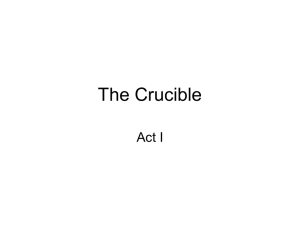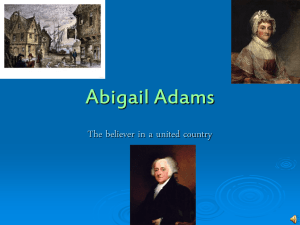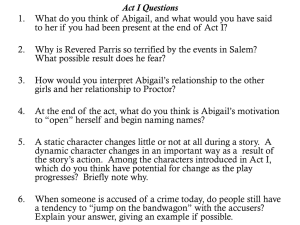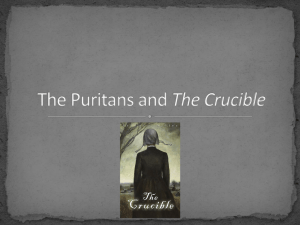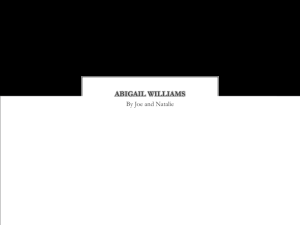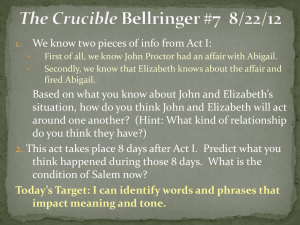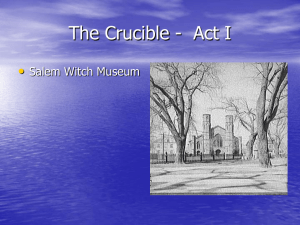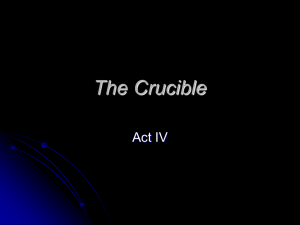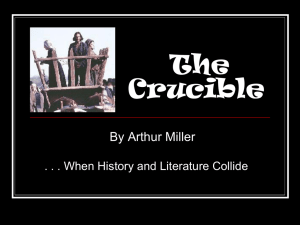Act 1 - TGS – English
advertisement
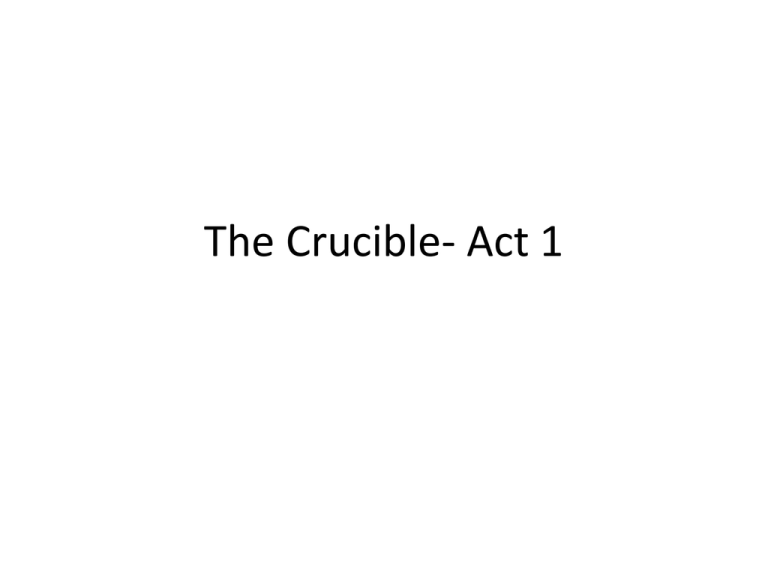
The Crucible- Act 1 Context Detailed description of Salem at the beginning, of Act 1. • People of Salem ‘did not celebrate Christmas’ and are ‘not permitted...to read a novel.’ Showing that they are religious and very strict. Described as a ‘strict and somber way of life.’ • People of Salem are suspicious of each other- ‘this predilection for minding other peoples business’ (they had a fondness of knowing everyone’s business) and it was this that ‘created many of the suspicions which were to feed the coming madness.’ This foreshadows events that will occur. • Describes how it was an area and a time whereby ‘hatreds of neighbours could now be openly expressed...despite the bibles charitable injunctions,’ and ‘one could cry witch against ones neighbour and feel perfectly justified.’ Literary devices • • • • • • • Opening description of Reverend Parris’ bedroom, ‘an air of clean spareness,’ and ‘wood colours are raw and unmellowed,’ shows how his room is basic and bare. The description of Rev Parris ‘kneeling beside the bed’ in which ‘Betty Parris...is lying on’ straightaway shows the audience that something is wrong with his daughter. The first description of Rev Parris is that ‘he cut a villainous path’ and that ‘there is very little good to be said for him.’ More to show that everyone blames each other is when talking about Tituba ‘trouble in this house eventually lands on her back’ showing that when their is trouble it is passed to other people such as Tituba. Parris on the surface appears to be anxious and nervous about his daughter but he is actually just worried about his reputation. He is shown to have child-like connotations ‘quaking with fear,’ ‘scrambling to his feet’ and ‘mumbling through his sobs.’ When Abigail enters she is ‘all worry and apprehension and propriety’ which may show that she is nervous about something she has perhaps done. During conversation between Parris and Abigail, stage directions shows Abigail’s inferiority, ‘quavering as she sits,’ ‘lowers her eyes,’ and ‘in terror.’ Towards the end of this conversation her stage directions turn from ‘innocently’ to ‘with an edge of resentment,’ and ‘in a temper.’ This shows how she is becoming more confident, defending her self and perhaps her true colours are being shown to the audience. Literary Devices • Mrs Putnam is described as a ‘twisted soul’ and a ‘death-ridden woman.’ • Mr Putnam is described as ‘a well-to-do hard-handed land owner,’ ‘a man with many grievances,’ he has a ‘vindictive nature,’ he is ‘deeply embittered.’ Also explain that ‘many accusations against people are in the handwriting of Thomas Putnam’ suggesting to the audience that he will play a main role in convicting people of witchcraft. • Mercy Lewis introduced. Described as ‘a fat, sly, merciless girl.’ • When Betty wakes up there is violent stage directions ‘pulling her (betty) away from the window,’ and ‘smashes her across the face.’ Shows a violence from Abigail. • Lexical choice by Abigail to Betty ‘Shut it!’ shows rudeness and colloquial tone. Showing also that Abigail has something to hide. Betty says ‘Mama! Mama!’ to show her innocence and makes the audience have sympathy for her. Also stage directions such as ‘she dissolves into sobs’ and ‘collapsing on the bed’ showing how she is vulnerable. • Abigail very threatening, figurative language used in her long piece of dialogue ‘I will come to you in the black of some terrible night,’ and ‘I can make you wish you had never seen the sun go down!’ Literary devices • • • • • • • • • Introduction of Proctor, ‘powerful of body,’ ‘even-tempered,’ ‘not easily led,’ ‘he is a sinner,’ but ‘respected and even feared in Salem.’ Mercy Lewis’ response to Proctor shows how Proctor has a clear instantaneous effect on people and she feels belittled by him. ‘Both afraid of him and strangely titillated.’ Childlike connotations in the presence of Proctor ‘on tip toe, absorbing his presence, wide eyed.’ The relationship between Proctor and Abigail is presented. Stage directions. When Proctor first looks at Abigail he has ‘the faintest suggestion of a knowing smile on his face,’ showing straightaway to the audience that there is something between them. Abigail has a ‘nervous laugh’ and ‘a trill of expectant laughter escapes her’ showing she cannot control her emotions around him. Proctor also calls her ‘Abby’ and she calls him ‘John’ showing a closeness and fondness of eachother. Mood is quickly changed however as Abigail ‘begins to anger,’ then it says ‘now softening’ which changes to ‘a flash of anger’ which then ends with ‘in tears.’ Proctor shows her vulnerability. Proctor calls Abigail ‘Child’ which is derogatory and she interrupts him showing that she doesn't fear him. ‘I look for John Proctor that took me from my sleep and put knowledge in my heart.’ –overly emotional. Metaphorical- ‘and now you bid me tear the light out of my eyes?’ Rebecca Nurse introduced. ‘the general opinion of her character was so high.’ Hale introduced ‘eager-eyed intellectual’ ‘concieves himself much as a young doctor’ ‘his goal is light, goodness and preservation.’ Parris is ‘delighted’ to see Hale. Introduction of Giles Corey, ‘most comical hero’ ‘blamed for so much’ ‘didnt give a hoot for public opinion’ ‘a nuisance’ –he doesnt care what people think of him, hes not taken seriously but he’s good at heart. Linguistic Devices • Rev Parris is shown to use a lot of exclamatives at the beginning to show his anxiety of what Salem and people will think. ‘Oh my, God! God help me!’ and ‘Out of my sight!’ • Abigail described with Pre-modifiers to exaggerate what she’s like e.g. Adverb and pre-modifier ‘strikingly beautiful’ Giving an instant good impression of Abigail. • During conversation between Abigail and Rev Parris, Parris uses lots of imperative sentence types to show his authority over Abigail, ‘go directly home and speak nothing of unnatural causes.’ Abigail also calls Parris ‘uncle’ (also showing affection) whilst he calls her ‘Child’ to show how Abigail is inferior. • Towards the end of their opening conversation, Abigail begins to use exclamatives ‘You mistake yourself, Uncle!’ showing how her confidence is growing and that she is trying to defend herself. She begins to use 1st person pronouns such as ‘I will not have it said that my name is soiled!’ She is becoming selfish and making it all about her. Linguistic Devices • • • • Putnam shown to have authority- Imperatives ‘Now look you, Parris,’ and ‘Tell Mr Parris what you have done.’ Lots of exclamatives ‘No, witchcraft!’ Also many interrogatives to question everyone, showing that he is dominant in the conversation and holding the floor: ‘Don’t you understand it, sir?’ Also uses simple sentences which are straight to the point and cant be argued with ‘It is a providence.’ Mercy Lewis shown to be lower than everyone else by her speech e.g. ‘her grandma come’ this is her idiolect, and it shows her to be less educated. Also use of adjacency pair shows how she is inferior, ‘you go home to ruth d’y’hear?’ ‘aye mum’ this is reflective of the fact that she is a servant and is following rules. Mary Warren: shows a negative face ‘I never done any of it, Abby. I only looked!’ showing how she is denying it. When Betty wakes up. Lots of exclamatives to build the tension ‘Betty, you never say that again!’ ‘You did, you did!’ Betty tries to hold the floor by interrupting Abigail twice in an attempt to control the conversation. However Abigail is the most dominant. Short, simple sentences ‘Now look you. All of you. We danced.’ shows Abigail to be quite threatening. Also use of inclusive pronoun ‘we’ allowing her to involve all of the girls so they all get into trouble. Linguistic devices • • • • • • • • • Proctor begins mainly with interrogatives and exclamative sentences e.g. ‘be you foolish, Mary Warren?’ and ‘I am looking for you more often than my cows!’ Abigail, starts using long sentences around Proctor ‘I cannot sleep for dreamin...through some door.’ Adverbs used to make more specific, Abigail clutches Proctor ‘desperately’ and Proctor pushes her away ‘firmly.’ Many interuptions by each showing that they are both trying to hold the floor. Repetition, Proctor copies what abigail says ‘Aye-but we did’ ‘Aye-but we did not.’ Lots of exclamatives from Abigail, ‘I cannot!’ ‘John, pity me!’ Lexical field of religion ‘i never knew the lying lessons i was taught by all these christian women and their covenanted men!’ Interrogative by Giles Corey ‘what signifies the reading of strange books?’ this may convey to the audience that even though it is not necessarily witch craft, the slughtest unorthodox behaviour automatically makes someone a suspects so it foreshadows what may happen further on. Ends with the girls shouting blame at each other, lots of exclamatives ‘I saw Goody Hawkins with the devil!’ ‘I saw George Jacobs with the devil!’ Rhetorical Devices • Parris repeats himself, ‘no-no’ when replying to Abigail. ‘No, no she never flew’ when replying to Mrs Putnam’ this shows his anxiety and how he tries to defend himself. • Putnam uses the rule of 3 when speaking to show his authority, persuade Parris and to get his point across ‘Come down, speak to them, pray with them.’ • Abigail uses repetition when talking to Proctor, ‘I know you John. I know you.’ this shows how she is trying to convince him and to get reasurance from him. It is also put in italics to create even more emphasis.
